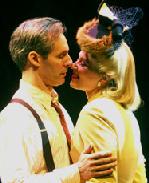SITE GUIDE
SEARCH
REVIEWS
FEATURES
NEWS
Etcetera and
Short Term Listings
LISTINGS
Broadway
Off-Broadway
NYC Restaurants
BOOKS and CDs
OTHER PLACES
Berkshires
London
California
DC
Philadelphia
Elsewhere
QUOTES
On TKTS
PLAYWRIGHTS' ALBUMS
LETTERS TO EDITOR
FILM
LINKS
MISCELLANEOUS
Free Updates
Masthead
Writing for Us
A CurtainUp Review
The Milliner
By Elyse Sommer
|
they think we’re German.—Amelia on the British who have given her and Wolfgang a visa so they could escape Nazism but have not accepted them with open arms. We are German.— Wolfgang |

Michel Gill and Caralyn Kozlowski
in The Milliner
(Photo: Bruce Gilkas)
|
The trajectory of Wolfgang (Mechel Gill) the milliner, from childhood to unhappy asylum in London and cataclysmic post-war return trips to Berln, is told in a flashback from Wolfgang's trial for a crime revealed only in a very melodramatic penultimate scene. In fact, if you don't pay close attention you're likely to miss reference to that trial and the events prompting Wolfgang's reminiscences.
Thus when in an early scene Wolfgang expresses distress to his mother (Maria Cellario) about being different from his friends by virtue of his circumcision, it's up to the audience to see the suit and tie clad Gillet as a young boy. Perhaps this is intended to also make us see beyond Wolfgang's idealized memories of the elegant hat shop, piano lessons and visits to the Philharmonic with his mother and her friend Frau Hedel (Donna Davis), as well as the gaiety of the cabaret where Claudia (Caralyn Kozlowski), a glamorous Aryan beauty sings à la Marlene Dietrich when not also tending a hat shop.
There are lots of little hints tossed into this impressionistic portrait of a man so stubbornly deluded that he is in denial about his mother's death in a concentration camp and the virulent anti-Semitism of ordinary Germans even after the war. His mother whose love for the milliner's craft, German music and poetry shaped him, indicates some awareness of the lurking menace of anti-semitism when she yearns to see Wofgang married to Claudia and under her breath says "you'd be safe with her." As it turns out he's a lot safer with the Amelia (Julia Haubner), the young artist he does marry, a much more realistic and adaptable German, also Jewish, who one gathers is responsible for their obtaining a British visa with which to leave Germany in 1938.
But for all its gripping atmosphere, Gill's intensely nuanced performance, Kozlowski's terrific musical interludes, and the casts overall excellence, there's something too fragmentary about this play's construct to add up to a satisfying and believable examination of a type of German Jew one doesn't encounter too often in holocaust literature.
Granted that Wofgang can draw a picture of his life without a single swastika armband, Heil Hitler salute or a jarring musical refrain from "DeutschlandÜber Alles", makes his final melodramatic act almost understandable. Someone so excessively deluded is more than likely to explode like a rocket when reality finally sets in. But, unless Ms. Glass intended this to be a portrait of a psychotic rather than that of a man whose misplaced love for his birthplace makes him unable to adjust to reality, this incomplete method of story telling also shows up quite a few plot holes. Take the scene when Wolfgang and Amelia have a fnal meal with his mother before using their British visas. The time is clearly 1938 but we have no inkling of the violence already in full swing: Jewish stores destroyed during Kristallnacht and Jewish men (even if baptized like Wolfgang) rounded up and sent to concentration camps for several months on end.
The expatriate scenes in Great Britain are also quite fascinating. The talk about Jews being interned by the British as Germans is actually based on fact (German Jewish refugess were sent to the Isle of Wight during the war), but it is too vague to add anything to the struggle going on between Wolfgang and Amelia during this period. As for Wolfgang's business trips to Germany immediately after the war's end, while Germans and Poles did journey back after the war, it's questionable whether he would have been able to travel to Germany quite so soon.
All these flaws not withstanding, and if you can suspend your disbelief about Wolfgang's immediate post-war travels to Germany, the scenes showing the persistent Nazi mentality of people like Claudia and the concierge with his lame "we had no idea " are well realized. The brief reappearance of Mrs. Hedel, introduces a truly heartwrenching cameo of a German who genuinely grieves for her countrymen's sins. And Wolfgang's action when the blinders finally drop from his eyes is orchestrated with operatic flair.
Gregory Gale's Costumes and Todd Edward Irvns' scenic design do wonders to make The Milliner watchable — and of course, Lynne Mackey's hats, which ring the top of the stage, are enough to make finely detailed head coverings fashionable again.
| The Milliner Playwright: Suzanne Glass Director: Mark Clements Cast: Michel Gill, Julia Haubner, Caralyn Kozlowski, Maria Cellario, Donna Davis, Steven Hauck, Glenn Kalison Sets: Todd Edward Ivins Costumes: Gregory Gale Lights: Jeff Nellis Sound: Music Director: Warren Willis Fight Director: Rick Sordelet Projections: Melissa M. Spengler Hats: Lynne Mackey Running Time: 2 hours plus 1 intermission The Directors Company at 13th Street Theatre, 212-352-3101 November 1, 2006 to December 17, 2006 Tue at 7pm; Wed - Sat at 8pm; Sat & Sun at 3pm Tickets: $45 to$35 Tuesday through Friday at 8 pm, Saturday at 3 & 8 pm; Sunday at 3 pm Reviewed by Elyse Sommer based on November 7 performance. |

Easy-on-the budget super gift for yourself and your musical loving friends. Tons of gorgeous pictures.

Leonard Maltin's 2007 Movie Guide

At This Theater
Leonard Maltin's 2005 Movie Guide

 >
>

